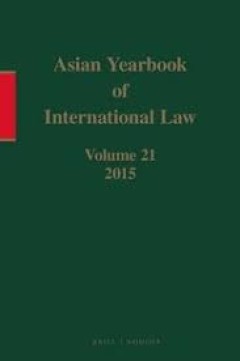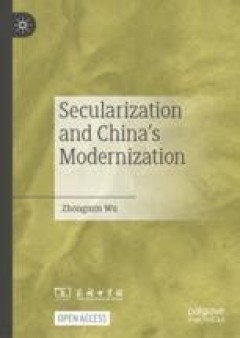Filter by

Asian Yearbook of International Law, Volume 21 (2015)
Launched in 1991, the Asian Yearbook of International Law is a major internationally-refereed yearbook dedicated to international legal issues as seen primarily from an Asian perspective. It is published under the auspices of the Foundation for the Development of International Law in Asia (DILA) in collaboration with DILA-Korea, the Secretariat of DILA, in South Korea. When it was launched, the…
- Edition
- Volume: 21
- ISBN/ISSN
- 978-90-04-34455-6
- Collation
- -
- Series Title
- -
- Call Number
- -

Secularization and China's Modernization
This open access book examines from the perspective of secularization. Since the publication of Max Weber's Protestant Ethics and the Spirit of Capitalism, how to realize modernization in developing countries has become an urgent problem to be demonstrated. Secularization has becoming endogenous power for Chinese modernization procedure, especially since 1978. However, to understand the foundat…
- Edition
- 1
- ISBN/ISSN
- 9789819780624
- Collation
- XI, 402 hlm; ill., lamp.,
- Series Title
- -
- Call Number
- -

Asian Yearbook of International Law, Volume 20 (2014)
- Edition
- Volume: 20
- ISBN/ISSN
- 978-90-04-37977-0
- Collation
- -
- Series Title
- -
- Call Number
- -
- Edition
- Volume: 20
- ISBN/ISSN
- 978-90-04-37977-0
- Collation
- -
- Series Title
- -
- Call Number
- -

Asian Yearbook of International Law, Volume 2 (1992)
The Asian Yearbook of International Law is the first publication dedicated primarily to international law as seen from an Asian perspective. It provides a forum for the publication of articles in the field of international law written by experts from the region, and also other articles relating to Asian topics. Its aim is twofold: to promote the dissemination of knowledge of international law i…
- Edition
- Volume: 2
- ISBN/ISSN
- 978-90-04-40061-0
- Collation
- -
- Series Title
- -
- Call Number
- -

Asian Yearbook of International Law, Volume 19 (2013)
- Edition
- Volume: 19
- ISBN/ISSN
- 78-90-04-37975-6
- Collation
- -
- Series Title
- -
- Call Number
- -
- Edition
- Volume: 19
- ISBN/ISSN
- 78-90-04-37975-6
- Collation
- -
- Series Title
- -
- Call Number
- -

Asian Yearbook of International Law, Volume 18 (2012)
- Edition
- Volume: 18
- ISBN/ISSN
- 978-90-04-37973-2
- Collation
- -
- Series Title
- -
- Call Number
- -
- Edition
- Volume: 18
- ISBN/ISSN
- 978-90-04-37973-2
- Collation
- -
- Series Title
- -
- Call Number
- -

Asian Yearbook of International Law, Volume 17 (2011)
- Edition
- Volume: 17
- ISBN/ISSN
- 978-90-04-37971-8
- Collation
- -
- Series Title
- -
- Call Number
- -
- Edition
- Volume: 17
- ISBN/ISSN
- 978-90-04-37971-8
- Collation
- -
- Series Title
- -
- Call Number
- -

Asian Yearbook of International Law, Volume 16 (2010)
- Edition
- Volume: 16
- ISBN/ISSN
- 978-90-04-37969-5
- Collation
- -
- Series Title
- -
- Call Number
- -
- Edition
- Volume: 16
- ISBN/ISSN
- 978-90-04-37969-5
- Collation
- -
- Series Title
- -
- Call Number
- -

Asian Yearbook of International Law, Volume 15 (2009)
- Edition
- Volume: 15
- ISBN/ISSN
- 978-90-04-43382-3
- Collation
- -
- Series Title
- -
- Call Number
- -
- Edition
- Volume: 15
- ISBN/ISSN
- 978-90-04-43382-3
- Collation
- -
- Series Title
- -
- Call Number
- -

Asian Yearbook of International Law, Volume 14 (2008)
- Edition
- Volume: 14
- ISBN/ISSN
- 978-90-04-43380-9
- Collation
- -
- Series Title
- -
- Call Number
- -
- Edition
- Volume: 14
- ISBN/ISSN
- 978-90-04-43380-9
- Collation
- -
- Series Title
- -
- Call Number
- -
 Computer Science, Information & General Works
Computer Science, Information & General Works  Philosophy & Psychology
Philosophy & Psychology  Religion
Religion  Social Sciences
Social Sciences  Language
Language  Pure Science
Pure Science  Applied Sciences
Applied Sciences  Art & Recreation
Art & Recreation  Literature
Literature  History & Geography
History & Geography